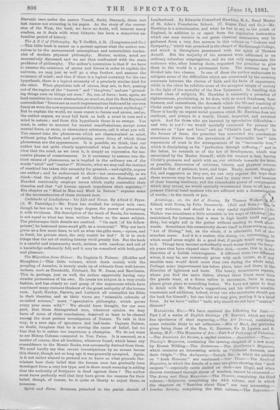The A B 0 of Philosophy. By T. Griffith, A.M.
(Longmans and Co.) —This little book is meant as a protest against what the author con- ceives to be the unwarranted assumptions and materialistic tenden- cies of modern physical philosophy. Matter, motion, mind are successively discussed, and we are thus confronted with the main problems of philosophy. The author's contention is that if we have to assume the existence of atoms and forces in order to explain the universe, we may just as well go a step further, and assume the existence of mind ; and that if there is a logical certainty for the one hypothesis, there is a logical necessity of a precisely similar kind for the other. When physicists talk of atoms, they are, in fact, passing out of the region of the " known " and "the given," and are "ground- ing things seen on things not seen." So, too, of force ; here, again, we land ourselves in a mere abstraction, so much so, that Du Bois Raymond contends that "forces are as mach impersonations fashioned by our own fancy as were the now superannuated divinities of ancient mythology." But to explain the world, we must resort to forces and atoms, and so, the author argues, we must fall back on both a mind in man and a mind in nature ; and from this hypothesis there is no escape. You must, in order to account for mental manifestations, accept some mental force, or atom, or elementary substance, call it what you will. You cannot take the phenomena which are characterised as mind, without going farther, and postulating some thing of which these phenomena are the appearances. It is possible, we think, that our author has not quite clearly apprehended what is involved in the view that the mind, as we term it, is simply an expression for suc- cessive phases of consciousness. Is it necessary to assume two dis- tinct causes of phenomena, as is implied in the ordinary use of the words "mind" and "matter ?" Hitherto, what we may call the instinct of mankind has taken this necessity for granted,—and rightly, argues our author ; and he endeavours to show—not unsuccessfully, as we think—that the philosophy of such thinkers as Hartmann and Haeckel continually employs terms which really contradict their theories, and that "all human speech repudiates their sophistry." His chapter on "Mind in Man and Mind in Nature" exposes some of the inconsistencies of these eminent men.
































 Previous page
Previous page